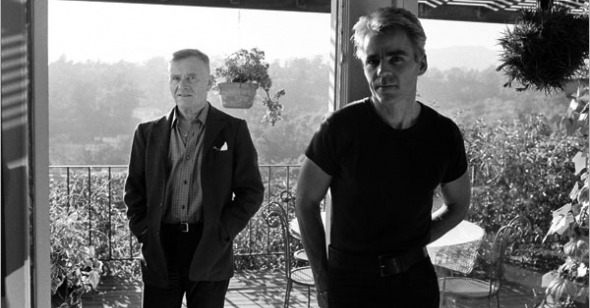Real Men
By Michael Koresky
Chris & Don: A Love Story
Dir. Tina Mascara and Guido Santi, U.S., Zeitgeist Films
If only someone would make a fictional gay romance that had as much feeling and depth as Tina Mascara and Guido Santi’s Chris & Don: A Love Story. A wistful, at times unbearably intimate study of the life-long love affair that Los Angeles portrait artist Don Bachardy has had with now-deceased British writer Christopher Isherwood, this documentary is wholly suffused with genuine romantic longing, even as it purposefully investigates the complex bonds between the two men—as lovers, as artists, as mentor/protégé, as father/son surrogates—with psychological clarity. While in description, a documentary focusing on the experiences of one pair of lovers might sound hermetic, Chris & Don comes across as remarkably expansive; rarely is love depicted onscreen with this much soul-rattling care.
Bachardy has now been living without Isherwood for more than 20 years, and that fact implicitly shapes the melancholy tone of Mascara and Santi’s film. Due to their thirty-year age difference, moralizing doubts had been cast on their romance from the very beginning; when they met in 1953, Bachardy was a gap-toothed, wiffle-headed 18-year-old with a cherubic, all-American face as fresh as cream, while Isherwood was already a weathered, well-traveled, Cambridge man of letters in his late forties. An acquaintance of Somerset Maugham, Aldous Huxley, and Swami Prabhavananda, as well as a onetime amorous partner of W.H. Auden, Isherwood was understandably a figure of awe for young Bachardy, whose self-knowledge and sexual awakening in 1950s Los Angeles were unavoidably formed by his older lover. Isherwood’s inspirational refusal to hide his queerness has left us not only with a generously open body of work (including his most famous book, Berlin Stories, ultimately the inspiration for Cabaret) but also, as this film testifies, a treasure trove of experiences that shed light on the queer community in southern California in the Fifties and Sixties.
Chris & Don contains some gorgeous color 8 mm footage of the couple in their early years, hobnobbing with such Fifties luminaries as Tennessee Williams, Igor Stravinsky, and Anna Magnani, or frolicking on the beach with rosy cheeks and supple flesh. Their obvious proclivity to record themselves for posterity has provided Mascara and Santi’s film with lovely counterpoint to Bachardy’s now aged frame. Indeed, with the artist, now in his seventies, seen hitting the gym and later capturing reclined handsome young men with his paintbrush, Chris & Don becomes something of a testament to the beauty of the male body and the limits of masculine self-preservation. For all of the remarkable images in the film, none is as affecting as when Bachardy displays the final drawings he made of Isherwood, sketched immediately after his death from cancer, before his body was removed from the house.
Bachardy’s tearing eyes and wavering voice, as always, infused with the ghost of his lover in its oddly British-accented mannerisms, speak volumes, and the filmmakers have wisely allowed him to narrate his own story. Even with its occasional flights of fancy, including greeting-card-like animations meant to evoke Chris and Don’s animal alter egos (the former a horse, the latter a cat) and a few flustered, titillating recreations of their early days and muted erotic encounters, the film never strays from its subjects’ close physical and emotional quarters. While Mascara and Santi easily could have used Chris and Don’s decade-spanning romance as a launching pad into considerations of contemporary domestic human rights issues, they wisely let it speak for itself, and let us hopefully follow by example.
